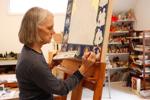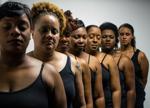While the post-pandemic road ahead remains uphill for many artists in Charleston and elsewhere in South Carolina, there has of late been a slate of support for individuals practicing art.
And the game is changing in how those artists are selected.
Recent recognition shines light on the artists not only for their work, but often factors in other considerations when determining who will get the nod. These can include an artist's commitment to one or more chosen disciplines, representation of the region in which they practice and their impact on the community.

Marcus Amaker has been named one of 23 poets laureate fellows of 2021 by the Academy of American Poets. Alice Keeney/Provided
In early June, Charleston Poet Laureate Marcus Amaker was awarded a $50,000 grant from the Academy of American Poets, placing him among 23 poet laureates across the country who were recognized.
In a statement, President and Executive Director Jennifer Benka said, “We are honored and humbled to fund poets who are devoted to their own craft and also their community. Poets will most certainly help guide us forward.”
“It is a wonderful thing to be able to be reassured that being an artist is a viable thing, and being a writer is a viable thing,” he told The Post and Courier at the time of the announcement. “Schools and society don’t always encourage that.”

Fletcher Williams III received one of nine $5000 fellowships awarded to artists throughout the southeast region by South Arts. File/Staff
In June, Charleston-based visual artist Fletcher Williams III received one of nine $5,000 fellowships awarded to artists throughout the Southeast by South Arts. As one of six arts organizations in the U.S. devoted to supporting artists in specific regions, South Arts partners with the state arts agencies of Alabama, Florida, Georgia, Kentucky, Louisiana, Mississippi, North Carolina, South Carolina and Tennessee with the goal of advancing the arts and the respective states.
During the pandemic, Williams mounted "Promiseland," large-scale site-specific exhibition at the Aiken-Rhett House Museum. A recent work was acquired by the Gibbes Museum of Art for their permanent collection.
Among the philanthropists who support South Arts is MacKenzie Scott, an author who promised to give away most of her wealth after her divorce settlement with Jeff Bezos. She has since allocated billions of dollars to support organizations in the fields of higher education, social justice and the arts.
One of those organizations is South Arts, which announced Scott has given an unrestricted gift to the agency, as part of a mid-June additional round of gifts adding up to $2.7 billion, spread out over 286 organizations in those designated fields.
In a June 15 post on Medium, Scott explained the reasoning behind her support of arts organizations.
"Arts and cultural institutions can strengthen communities by transforming spaces, fostering empathy, reflecting community identity, advancing economic mobility, improving academic outcomes, lowering crime rates, and improving mental health," she wrote, adding that she and her team evaluated smaller arts organizations that were fostering those benefits with artists and audiences from culturally rich regions while also identifying groups that donors often overlook.
This year, South Arts shifted its grant application process from being anonymous, or "blind," stating in their guidelines that they have come to learn that such processes "may perpetuate a fall-back to familiarity and assumptions, removing the ability of the panelist to deliberate about inclusion and diversity in all aspects of the works." The jurors, who represent a two-tiered, national process, make selections based on "artistic excellence that reflects and represents the diversity of the region."
In June, the S.C. Arts Commission Board of Directors approved four $5,000 fellowships. The grant awards are among several for fiscal 2022, with others to be announced later.
The four fellows are Kristi Ryba of Charleston County in visual art; Clay Burnette of Richland County for craft; Sherard “Shekeese” Duvall of Richland County for media production; and Triza Cox of Florence County for media screenwriting.
According to the South Carolina Arts Commission, individual South Carolina artists were invited to apply last fall for a fellowship in any of the four categories represented in the 2022 cycle, which rotates artistic disciplines each year.
Out-of-state panelists representing arts practitioners in cities across the country were recruited from each of those disciplines to review applications and recommend recipients of each fellowship.
The grants also represent a shift in selection methodology. These and future applications are no longer anonymous and awards will no longer be determined based solely on artistic merit, but will also factor in achievements and commitment to the discipline in which the artists apply.
Along with financial support, such awards can offer other benefits to artists.

Artist Kristi Ryba is among the four recipients of grants from the South Carolina Arts Commission for the 2022 fiscal year. South Carolina Arts Commission/Provided
“Fellowships recognize and reward the artistic achievements of exceptional South Carolina individual artists. Recognition from a fellowship lends artistic prestige and can often open doors to other resources and employment opportunities,” said Executive Director David Platts. “We will no doubt hear more from these amazing artists, and we congratulate them on this honor.”
Charleston artist Ryba, who received the grant in the visual arts category, has a resume that demonstrates the commitment the commission underscored. Recent works, which have been on exhibit at the Gibbes Museum of Art's for-sale gallery, have offered a wry Medieval take on political figures.
Her work has toured the southeast since 1990 and she has participated in ongoing development and training programs. She also founded Print Studio South Inc., where she had served as its president and on its board, and has taught locally in both adult and children's programs.
For more information on funding opportunities for the arts, visit southcarolinaarts.com.
"artist" - Google News
July 25, 2021 at 01:00AM
https://ift.tt/3zyer3q
In SC, artist support is coming, but the game is changing - Charleston Post Courier
"artist" - Google News
https://ift.tt/2FwLdIu
Bagikan Berita Ini

















0 Response to "In SC, artist support is coming, but the game is changing - Charleston Post Courier"
Post a Comment